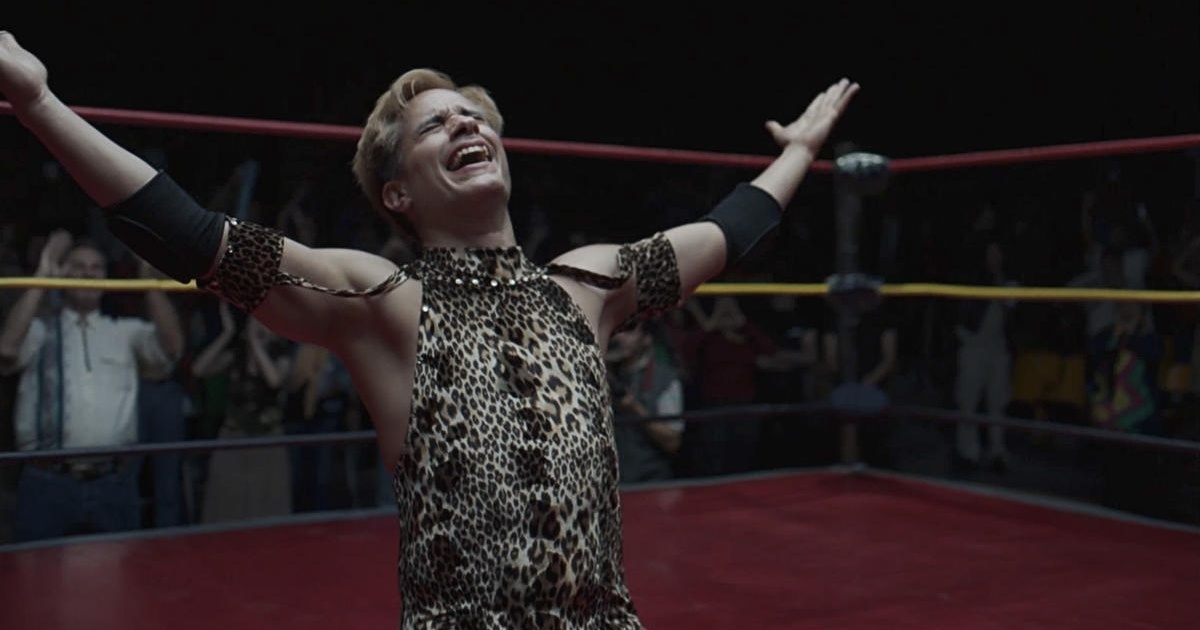
The first film on this latest dispatch from Park City is one of the few biopics playing this year’s festival. Entitled Cassandro, director Roger Ross Williams (making his fiction feature debut behind the camera) introduces viewers to a profoundly influential person most may not know anything about. Known in the ring as Cassandro, the film tells the story of the iconic gay luchador and his rise from his days as the masked “jobber” El Topo to breaking ground as one of the first “exoticos” (male wrestlers who more or less wrestle in “drag” to garner “heat” from the audiences) to be booked to win their matches.
The film stars Gael Garcia Bernal as Cassandro, turning in a performance of profound humanity and nuance. Cassandro as a character is a very lively, boundlessly charismatic ring presence, however out of the ring is an entirely different story. Bernal brings to life both sides of the character, the man who simply wants to find a place in a world that’s all but dismissed him and the luchador who embodies all that is great and powerful in wrestling. It’s a quietly moving performance of genuine compassion and paired with Williams’ equally intimate and tender direction, Cassandro becomes a truly special motion picture.
Speaking of special motion pictures, another one of those from this year’s festival has a generational lead performance behind it. Magazine Dreams stars Jonathan Majors as Killian Maddox, an amateur bodybuilder with dreams of making his way to the cover of those fitness magazines you see at your local market. Living with his ill father and working an endless job at a local grocery store, Killian is living on a razor’s edge, with increasing volatility that appears to amplify every new day.
While never once losing sight of Killian’s humanity, Majors is electrifying here, embodying this troubled soul with a livewire energy that can stray from beautiful, if awkward, warmth (there’s a conversation here between him and a cashier he likes that’s as touching as it is frustratingly relatable) to unrelenting anger and brutality. This isn’t a film that turns from the abyss. No, instead director Elijah Bynum instead leans into it, making it home to a story about a young man’s strive for a place in this world, a world he only knows as being full of violence and toxic masculinity. This is, after all, a film very much about masculinity, particularly its focus on “being remembered.” If the final, haunting sequence is to be believed, this portrait of one man’s desire to leave an impact on the world is bound to be one of the year’s most talked about film.
Next up, we dive into one of the festival’s most hotly talked about adaptations. Based on the Kristen Roupenian-penned New Yorker story of the same name, Cat Person stars Emilia Jones as Margot, a college student working part time as a concessions attendant at a local movie theater. One evening she encounters Robert (Nicolaus Braun), a 33-year-old film dork, and the two seemingly hit it off. However, as the relationship progresses, awkward moments give way to intense bouts of discomfort and potential wrongdoing. One of the most talked about pieces of journalism/editorial of recent times, Cat Person has given way to a film very much about modern romance, and all the murkiness therein, and a quietly frustrating one at that.
For two solid acts, the film cooks at a startlingly poppy clip. The chemistry between both Jones and Braun is rightly gray, not entirely locked in but they also clearly have something there. However, as the film progresses the relationship changes and the film brilliantly portrays these internal conversations through things like dreamed therapy sessions or our lead being talked through each moment by a physical embodiment of her sub-conscious. It’s a rather astonishing bit of filmmaking, with director Susanna Fogel adapting the piece with startling texture. However, with a final act that completely unravels, the film leaves a frustratingly sour taste in one’s mouth. That said, this remains one of the real surprises of the festival.
Finally, onto what may be the best medium-length film of the festival, and one of the few truly *great* films of this year’s festival. From legendary avant-garde filmmaker Deborah Stratman comes Last Things a 50-minute dive into the history of, well, everything, as told through rocks. Moreso, the film uses everything from literature (the film opens with a reading of the introduction from Clarice Lispector’s The Hour of the Star) to vintage scientific models to create a meditation on time and space through the lens of rocks.
Sounding dryer than licking one of those said rocks, the film in actuality is a gorgeous, almost dystopian exploration of history as a geological survey. Stratman’s direction is almost cosmic, despite her use of microscopic photography, turning every nook and cranny of a rock into a new cave to explore and be placed in awe of. Pairing this opposite sci-fi texts and scientific discourse, Stratman’s film becomes something so purely cinematic that one can’t but help and be shaken by it. In just 50 minutes, the film turns into something almost poetic, a document seemingly lost in time and space. It’s something truly otherworldly.



